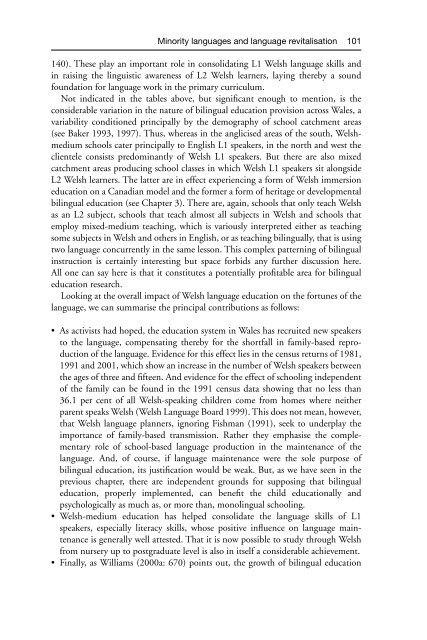Gibson Ferguson Language Planning and Education Edinburgh ...
Gibson Ferguson Language Planning and Education Edinburgh ...
Gibson Ferguson Language Planning and Education Edinburgh ...
Create successful ePaper yourself
Turn your PDF publications into a flip-book with our unique Google optimized e-Paper software.
Minority languages <strong>and</strong> language revitalisation 101<br />
140). These play an important role in consolidating L1 Welsh language skills <strong>and</strong><br />
in raising the linguistic awareness of L2 Welsh learners, laying thereby a sound<br />
foundation for language work in the primary curriculum.<br />
Not indicated in the tables above, but significant enough to mention, is the<br />
considerable variation in the nature of bilingual education provision across Wales, a<br />
variability conditioned principally by the demography of school catchment areas<br />
(see Baker 1993, 1997). Thus, whereas in the anglicised areas of the south, Welshmedium<br />
schools cater principally to English L1 speakers, in the north <strong>and</strong> west the<br />
clientele consists predominantly of Welsh L1 speakers. But there are also mixed<br />
catchment areas producing school classes in which Welsh L1 speakers sit alongside<br />
L2 Welsh learners. The latter are in effect experiencing a form of Welsh immersion<br />
education on a Canadian model <strong>and</strong> the former a form of heritage or developmental<br />
bilingual education (see Chapter 3). There are, again, schools that only teach Welsh<br />
as an L2 subject, schools that teach almost all subjects in Welsh <strong>and</strong> schools that<br />
employ mixed-medium teaching, which is variously interpreted either as teaching<br />
some subjects in Welsh <strong>and</strong> others in English, or as teaching bilingually, that is using<br />
two language concurrently in the same lesson. This complex patterning of bilingual<br />
instruction is certainly interesting but space forbids any further discussion here.<br />
All one can say here is that it constitutes a potentially profitable area for bilingual<br />
education research.<br />
Looking at the overall impact of Welsh language education on the fortunes of the<br />
language, we can summarise the principal contributions as follows:<br />
• As activists had hoped, the education system in Wales has recruited new speakers<br />
to the language, compensating thereby for the shortfall in family-based reproduction<br />
of the language. Evidence for this effect lies in the census returns of 1981,<br />
1991 <strong>and</strong> 2001, which show an increase in the number of Welsh speakers between<br />
the ages of three <strong>and</strong> fifteen. And evidence for the effect of schooling independent<br />
of the family can be found in the 1991 census data showing that no less than<br />
36.1 per cent of all Welsh-speaking children come from homes where neither<br />
parent speaks Welsh (Welsh <strong>Language</strong> Board 1999). This does not mean, however,<br />
that Welsh language planners, ignoring Fishman (1991), seek to underplay the<br />
importance of family-based transmission. Rather they emphasise the complementary<br />
role of school-based language production in the maintenance of the<br />
language. And, of course, if language maintenance were the sole purpose of<br />
bilingual education, its justification would be weak. But, as we have seen in the<br />
previous chapter, there are independent grounds for supposing that bilingual<br />
education, properly implemented, can benefit the child educationally <strong>and</strong><br />
psychologically as much as, or more than, monolingual schooling.<br />
• Welsh-medium education has helped consolidate the language skills of L1<br />
speakers, especially literacy skills, whose positive influence on language maintenance<br />
is generally well attested. That it is now possible to study through Welsh<br />
from nursery up to postgraduate level is also in itself a considerable achievement.<br />
• Finally, as Williams (2000a: 670) points out, the growth of bilingual education






